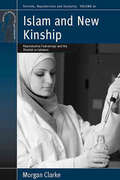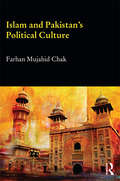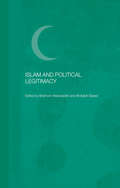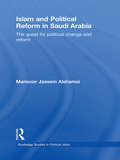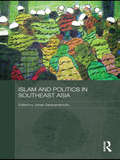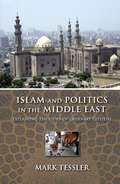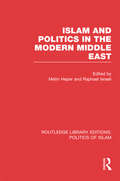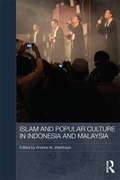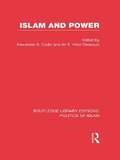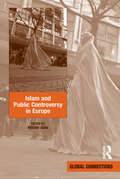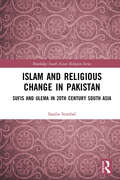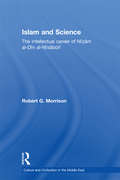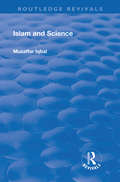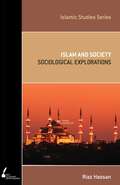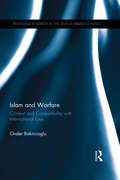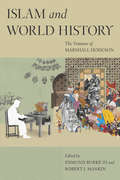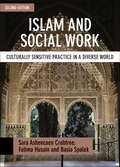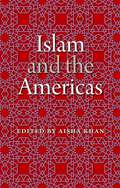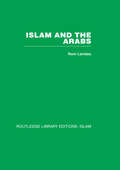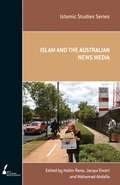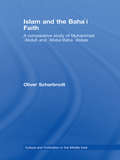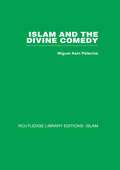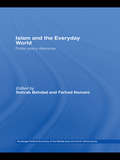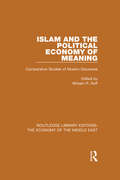- Table View
- List View
Islam and New Kinship: Reproductive Technology and the Shariah in Lebanon (Fertility, Reproduction and Sexuality: Social and Cultural Perspectives #16)
by Morgan ClarkeAssisted reproductive technologies such as in vitro fertilization have provoked global controversy and ethical debate. This book provides a groundbreaking investigation into those debates in the Islamic Middle East, simultaneously documenting changing ideas of kinship and the evolving role of religious authority in the region through a combination of in-depth field research in Lebanon and an exhaustive survey of the Islamic legal literature. Lebanon, home to both Sunni and Shiite Muslim communities, provides a valuable site through which to explore the overall dynamism and diversity of global Islamic debate. As this book shows, Muslim perspectives focus on the moral propriety of such controversial procedures as the use of donor sperm and eggs as well as surrogacy arrangements, which are allowed by some authorities using surprising and innovative legal arguments. These arguments challenge common stereotypes of the rigidity and conservatism of Islamic law and compel us to question conventional contrasts between ‘liberal’ and Islamic notions of moral freedom, as well as the epistemological assumptions of anthropology’s own ‘new kinship studies’. This book will be essential reading for anyone interested in contemporary Islam and the impact of reproductive technology on the global social imaginary.
Islam and Pakistan's Political Culture (Durham Modern Middle East and Islamic World Series)
by Farhan Mujahid ChakThis book explores the ideological rivalry which is fuelling political instability in Muslim polities, discussing this in relation to Pakistan. It argues that the principal dilemma for Muslim polities is how to reconcile modernity and tradition. It discusses existing scholarship on the subject, outlines how Muslim political thought and political culture have developed over time, and then relates all this to Pakistan’s political evolution, present political culture, and growing instability. The book concludes that traditionalist and secularist approaches to reconciling modernity and tradition have not succeeded, and have in fact led to instability, and that a revivalist approach is more likely to be successful.
Islam and Political Legitimacy
by Shahram Akbarzadeh Abdullah SaeedAkbarzadeh and Saeed explore one of the most challenging issues facing the Muslim world: the Islamisation of political power. They present a comparative analysis of Muslim societies in West, South, Central and South East Asia and highlight the immediacy of the challenge for the political leadership in those societies. Islam and Political Legitimacy contends that the growing reliance on Islamic symbolism across the Muslim world, even in states that have had a strained relationship with Islam, has contributed to the evolution of Islam as a social and cultural factor to an entrenched political force. The geographic breadth of this book offers readers a nuanced appraisal of political Islam that transcends parochial eccentricities. Contributors to this volume examine the evolving relationship between Islam and political power in Bangladesh, Indonesia, Iran, Malaysia, Pakistan, Saudi Arabia and Uzbekistan.Researchers and students of political Islam and radicalism in the Muslim world will find Islam and Political Legitimacy of special interest. This is a welcome addition to the rich literature on the politics of the contemporary Muslim world.
Islam and Political Reform in Saudi Arabia: The Quest for Political Change and Reform (Routledge Studies in Political Islam)
by Mansoor Jassem AlshamsiThis book examines the link between Islamic thought/jurisprudence on the one hand and political action on the other. It shows how reformism is deeply rooted in Islamic tradition and how Sunni scholars have become activists for change in Saudi Arabia.
Islam and Politics in Southeast Asia (Routledge Malaysian Studies Series)
by Johan SaravanamuttuSoutheast Asia manifests some of the most interesting, non-violent as well as conflictual elements of Islamic social and political life in the world. This book examines the ways in which Muslim politics in Southeast Asia has greatly impacted democratic practice and contributed to its practical and discursive development. It addresses the majority and minority situations of Muslims within both democratic and authoritarian politics. It shows, for example, how in Muslim majority Indonesia and Malaysia, political Islam directly engages with procedural democracy; in Muslim minority Thailand and the Philippines, it has taken a violent route; and in Muslim minority Singapore, it has been successfully managed through civil and electoral politics. By exploring such nuances, variations, comparisons and linkages among Muslim majority and minority countries, this book deepens our understanding of the phenomenon of Muslim politics in the region as a whole.
Islam and Politics in the Middle East: Explaining The Views Of Ordinary Citizens
by Mark TesslerSome of the most pressing questions in the Middle East and North Africa today revolve around the proper place of Islamic institutions and authorities in governance and political affairs. Drawing on data from 42 surveys carried out in fifteen countries between 1988 and 2011, representing the opinions of more than 60,000 men and women, this study investigates the reasons that some individuals support a central role for Islam in government while others favor a separation of religion and politics. Utilizing his newly constructed Carnegie Middle East Governance and Islam Dataset, which has been placed in the public domain for use by other researchers, Mark Tessler formulates and tests hypotheses about the views held by ordinary citizens, offering insights into the individual and country-level factors that shape attitudes toward political Islam.
Islam and Politics in the Modern Middle East (Routledge Library Editions: Politics of Islam)
by Metin Heper Raphael IsraeliThe recent resurgence of Islam in the Middle East is a far more complex phenomenon than is often suggested by those analyses which reduce recent developments in the area to no more than an intensification of religiosity. Islam and Politics in the Modern Middle East challenges that perception of the contemporary Middle East. It explores the nature of the Islamic revival and attempts to establish the original impulse behind particular instances of Islamic resurgence. It also examines the degree to which religious institutions have served as a mechanism for expressing secular demands and frustrations and investigates to what extent politics is a functional alternative to religion. First published in 1984.
Islam and Popular Culture in Indonesia and Malaysia (Media, Culture and Social Change in Asia)
by Andrew N. WeintHome to approximately one-fifth of the world’s Muslim population, Indonesia and Malaysia are often overlooked or misrepresented in media discourses about Islam. Islam is a religion but there is also a popular culture, or popular cultures of Islam that are mass mediated, commercialized, pleasure-filled, humorous, and representative of large segments of society. During the last forty years, popular forms of Islam, targeted largely towards urbanized youth, have played a key role in the Islamisation of Indonesia and Malaysia. This book focuses on these forms and the accompanying practices of production, circulation, marketing, and consumption of Islam. Dispelling the notion that Islam is monolithic, militaristic, and primarily Middle Eastern, the book emphasizes its dynamic, contested, and performative nature in contemporary South East Asia. Written by leading scholars alongside media figures, such as Rhoma Irama and Ishadi SK, the case studies although not focused on theology per se, illuminate how Muslims (and non-Muslims) in Indonesia and Malaysia make sense of their lives within an increasingly pervasive culture of Islamic images, texts, film, songs, and narratives.
Islam and Power (Routledge Library Editions: Politics of Islam)
by Alexander S. Cudsi and Ali E. Hillal DessoukiThe 1970s witnessed a mushrooming of Islamic movements and ideas which was described variously as Islamic revival, Islamic resurgence and Islam on the march. Whether as part of the majority or minority, whether under capitalist or socialist regimes, Muslims have been moved by this reawakening. But what really are the causes and nature of this Islamic resurgence? Is it a purely religious revival? Or is it a social and political movement that must be understood in the context of the Muslim’s conditions and milieu? Will it really lead to the establishment of an Islamic socio-political order or will it end up as an instrument of struggle between Muslim ruling elites and their opposition? And what are the foreign policy implications of these developments? Do they necessarily lead to a more militant and hostile attitude towards the West? These questions and more are tackled by the contributors to Islam and Power. First published in 1981.
Islam and Public Controversy in Europe
by Nilüfer GöleThe public visibility of Islam is becoming increasingly controversial throughout European countries. With case studies drawn from France, Germany, Italy, Spain and the UK, this book examines a range of public issues, including mosque construction, ritual slaughter, Sharia councils and burqa bans, addressing the question of ’Islamic difference’ in public life outside the confines of established normative discourses that privilege freedom of religion, minority rights or multiculturalism. Acknowledging the creative role of dissent, it explores the manner in which public controversies unsettle the religious-secular divide and reshape European norms in the domains of aesthetics, individual freedom, animal rights and law. Developing an innovative conceptual framework and elaborating the notion of controversy as a methodological tool, Islam and Public Controversy in Europe draws our attention to the processes of interaction, confrontation and mutual transformation, thereby opening up a new horizon for rethinking difference and pluralism in Europe. As such, it will appeal to scholars across the social sciences with interests in religion, integration, cultural difference and the public sphere.
Islam and Religious Change in Pakistan: Sufis and Ulema in 20th Century South Asia (Routledge South Asian Religion Series)
by Saadia SumbalThis book examines the history of, and the contestations on, Islam and the nature of religious change in 20th century Pakistan, focusing in particular on movements of Islamic reform and revival. This book is the first to bring the different facets of Islam, particularly Islamic reformism and shrine-oriented traditions, together within the confines of a single study ranging from the colonial to post-colonial era. Using a rich corpus of Urdu and Arabic material including biographical accounts, Sufi discourses (malfuzat), letter collections, polemics and unexplored archival sources, the author investigates how Islamic reformism and shrine-oriented religiosity interacted with one another in the post-colonial state of Pakistan. Focusing on the district of Mianwali in Pakistani northwestern Punjab, the book demonstrates how reformist ideas could only effectively find space to permeate after accommodating Sufi thoughts and practices; the text-based religious identity coalesced with overlapped traditional religious rituals and practices. The book proceeds to show how reformist Islam became the principal determinant of Islamic identity in the post-colonial state of Pakistan and how one of its defining effects was the hardening of religious boundaries. Challenging the approach of viewing the contestation between reformist and shrine-oriented Islam through the lens of binaries modern/traditional and moderate/extremist, this book makes an important contribution to the field of South Asian religion and Islam in modern South Asia.
Islam and Science: The Intellectual Career of Nizam al-Din al-Nisaburi (Culture and Civilization in the Middle East)
by Robert MorrisonIn examining the work of eminent fourteenth century Iranian Shiite scholar Nizam al-Din al-Nisaburi, this book is the first rigorous attempt to explain the cross-fertilization of scientific and religious thought in Islamic civilization. Nisaburi did not consider himself a scientist alone, being commissioned by his patrons to work in a variety of fields. Islam and Science examines in detail the relationship between the metaphysics of Nisaburi's science, and statements he made in his Qur'an commentary and in other non-scientific writings. Sources suggest that Nisaburi was inspired to begin his scientific career by the inclusion of basic science in a religious (madrasa) education. By mid-career, he had found methodological similarities between theoretical astronomy and Islamic jurisprudence. Morrison concludes that while Nisaburi believed science could give one a taste of God's knowledge, he realised that the study of science and natural philosophy alone could not lead him to a spiritual union with God. Only Sufi practice and Sufi theory could accomplish that. Morrison's work is remarkable in synthesizing the history of Islamic science with other areas of Islamic studies. It will be of interest to students and scholars of religion and the history of science, as well as readers with a more general interest in Middle Eastern studies. Winner of the Iranian World Prize for Book of the Year in Islamics Studies 2009
Islam and Science: Volume 1 (Routledge Revivals Ser.)
by Muzaffar IqbalThis title was first published in 2002. This text seeks to provide the necessary background for understanding the contemporary relationship between Islam and modern science. Presenting an authentic discourse on the Islamic understanding of the physical cosmos, Muzaffar Iqbal explores God's relationship to the created world and the historical and cultural forces that have shaped and defined Muslim attitudes towards science. What was Islamic in the Islamic scientific tradition? How was it rooted in the Qur'anic worldview and whatever happened to it? These are some of the facets of this account of a tradition that spans eight centuries and covers a vast geographical region. Written from within, this ground-breaking exploration of some of the most fundamental questions in the Islam and science discourse, explores the process of appropriation and transformation of the Islamic scientific tradition in Europe during the three centuries leading up to the Scientific revolution.
Islam and Society: Sociological Explorations (Islamic Studies Series)
by Riaz HassanThe central focus of this volume is to explore and highlight the nexus between the ideology of Islam and social and cultural milieus with the aim of reconceptualising the sacred as a socially constructed reality and not a transcendental supernatural phenomenon. From this perspective, human agency and society become the main focus for shaping, perpetuating and institutionalising religious beliefs, ideas and practices, opening up space for empirical and sociological analyses of religious phenomena. The seven essays in this volume seek to explore and examine some of the key debates in contemporary sociology of Islam. The topics explored are: social factors in the origins of Islam; social theory and Muslim society; Islam and politics in South Asia; Muslim piety; anti-Semitism; the social foundations of Muhammad's prophetic mission, with a special reference to Arab historical memory and the role of his first wife Khadija bint Khuwaylid; and the barriers to social inclusion of Australian Muslims in Australian society. Islamic Studies Series - Volume 14
Islam and Warfare: Context and Compatibility with International Law (Routledge Research in the Law of Armed Conflict)
by Onder BakirciogluThe question of how Islamic law regulates the notions of just recourse to and just conduct in war has long been the topic of heated controversy, and is often subject to oversimplification in scholarship and journalism. This book traces the rationale for aggression within the Islamic tradition, and assesses the meaning and evolution of the contentious concept of jihad. The book reveals that there has never been a unified position on what Islamic warfare tangibly entails, due to the complexity of relevant sources and discordant historical dynamics that have shaped the contours of jihad. Onder Bakircioglu advocates a dynamic reading of Islamic law and military tradition; one which prioritises the demands of contemporary international relations and considers the meaning and application of jihad as contingent on the socio-political forces of each historical epoch. This book will be of great interest to scholars and students of international law, Islamic law, war and security studies, and the law of armed conflict.
Islam and World History: The Ventures of Marshall Hodgson (Silk Roads Ser.)
by Edmund Burke III Robert J. MankinPublished in 1974, Marshall Hodgson’s The Venture of Islam was a watershed moment in the study of Islam. By locating the history of Islamic societies in a global perspective, Hodgson challenged the orientalist paradigms that had stunted the development of Islamic studies and provided an alternative approach to world history. Edited by Edmund Burke III and Robert Mankin, Islam and World History explores the complexity of Hodgson’s thought, the daring of his ideas, and the global context of his world historical insights into, among other themes, Islam and world history, gender in Islam, and the problem of Muslim universality. In our post-9/11 world, Hodgson’s historical vision and moral engagement have never been more relevant. A towering achievement, Islam and World History will prove to be the definitive statement on Hodgson’s relevance in the twenty-first century and will introduce his influential work to a new generation of readers.
Islam and social work: Culturally Sensitive Practice in a Diverse World (BASW/Policy Press titles)
by Sara Ashencaen Crabtree Fatima HusainThis unique textbook enables social work practitioners to gain a deeper understanding of how Islamic principles inform and influence the lives of Muslim populations. Designed to support work with families and faith communities, this completely revised and updated edition examines religious precepts, cosmologies, philosophies and daily practices, while acknowledging cultural variants and population heterogeneity. It includes a comprehensive update of the research literature, international case studies, and new sections on religious extremism and ageing and end-of-life. This is the only book specifically on social work with Muslim communities and provides an essential toolkit for culturally sensitive social work practice.
Islam and the Americas (New World Diasporas)
by Aisha Khan"A tour de force that underwrites and shifts the petrified image of Islam disseminated by mainstream media."--Walter D. Mignolo, author of The Darker Side of Western Modernity "Gives us an entirely different picture of Muslims in the Americas than can be found in the established literature. A complex glimpse of the rich diversity and historical depth of Muslim presence in the Caribbean and Latin America."--Katherine Pratt Ewing, editor of Being and Belonging: Muslim Communities in the United States since 9/11 "Finally a broad-ranging comparative work exploring the roots of Islam in the Americas! Drawing upon fresh historical and ethnographic research, this book asks important questions about the politics of culture and globalization of religion in the modern world."--Keith E. McNeal, author of Trance and Modernity in the Southern Caribbean In case studies that include the Caribbean, Latin America, and the United States, the contributors to this interdisciplinary volume trace the establishment of Islam in the Americas over the past three centuries. They simultaneously explore Muslims’ lived experiences and examine the ways Islam has been shaped in the "Muslim minority" societies in the New World, including the Gilded Age’s fascination with Orientalism, the gendered interpretations of doctrine among Muslim immigrants and local converts, the embrace of Islam by African American activist-intellectuals like Malcolm X, and the ways transnational hip hop artists re-create and reimagine Muslim identities. Together, these essays challenge the typical view of Islam as timeless, predictable, and opposed to Western worldviews and value systems, showing how this religious tradition continually engages with local and global issues of culture, gender, class, and race.
Islam and the Arabs
by Rom LandauOriginally published in 1958, this volume covers important aspects of Islamic history and culture: Arabia before the Prophet The Prophet The Koran and Islam The Caliphate From the Caliphate to the end of the Ottoman The Crusades The Maghreb Muslim Spain The Sharia Philosophy The Sciences Literature The Arts Problems of the Twentieth Century Arab World
Islam and the Australian News Media (Islamic Studies Series)
by Jacqui Ewart Mohamad Abdalla Dr Halim RaneFew issues have captured media headlines over the past two decades like Islam and Muslims, and much of what the Australian public knows about Islam and its followers is gleaned from the mass media. Islam and the Australian News Media tackles head-on the Australian news media's treatment of Islam and Muslims.This incisive collection brings together the research and insights of academics, editors and journalists on the representation of Islam and its impact on social relations, the newsworthiness of Muslim issues and the complexities of covering Islam. Importantly, Islam and the Australian News Media also explores how Muslim communities in Australia are responding to their image in the Australian news media.This book is a must-read for all those interested in the relationship between media and society. Islamic Studies Series - Volume 4
Islam and the Baha'i Faith: A Comparative Study of Muhammad ‘Abduh and ‘Abdul-Baha ‘Abbas (Culture and Civilization in the Middle East)
by Oliver ScharbrodtMuhammad ‘Abduh (1849-1905) was one of the key thinkers and reformers of modern Islam who has influenced both liberal and fundamentalist Muslims today. ‘Abdul-Baha (1844-1921) was the son of Baha’ullah (1817-1892), the founder of the Baha’i Faith; a new religion which began as a messianic movement in Shii Islam, before it departed from Islam. Oliver Scharbrodt offers an innovative and radically new perspective on the lives of these two major religious reformers in 19th century Middle East by placing both figures into unfamiliar terrain. While one would classify ‘Abdul-Baha, leader of a messianic movement which claims to depart from Islam, as an exponent of heresy in Islam, ‘Abduh is perceived as an orthodox Sunni reformer. This book, however, argues against the assumption that both represent two extremely opposite expressions of Islamic religiosity. It shows that both were influenced by similar intellectual and religious traditions of Islam and that both participated in the same discussions on the reform of Islam in the 19th century. Islam and the Baha'i Faith provides new insights into the Islamic background of the Baha’i Faith and into ‘Abduh’s own association with so-called heretical movements in Islam.
Islam and the Divine Comedy
by Miguel Asin PalaciosWhen first published in 1926 this book aroused much controversy. The theory expounded in the book was that Islamic sources in general, and the writings of Ibn al-`Arabi in particular, formed the basis of Dante’s poem Divine Comedy, the poem which symbolised the whole culture of medieval Christianity. The book shows how fundamental Muslim legends of the nocturnal journey and of the ascension of the Prophet Muhammed appear in Dante’s writings.
Islam and the Everyday World: Public Policy Dilemmas (Routledge Political Economy of the Middle East and North Africa #Vol. 4)
by Sohrab Behdad Farhad NomaniThis is a new examination of how Shari’a law affects public policy both theoretically and in practice, across a wide range of public policy areas, including for example human rights and family law. The process by which public policy is decided - through elections, debates, political processes, and political discourse - has an additional dimension in the Islamic world. This is because Shari'a (divine law) has a great deal to say on many mundane matters of everyday life and must be taken into account in matters of public policy. In addition, matters are complicated further by the fact that there are differing interpretations of the Shari'a and how it should be applied to contemporary social issues. Written by leading experts in their field, this is the first comprehensive single volume analysis of Islam and public policy in the English language and offers further understanding of Islam and its wider social and political implications.
Islam and the Path to Human and Economic Development
by Abbas Mirakhor Hossein AskariThis book briefly surveys the evolution of the Western concept of development, recognizing the wider dimensions of human and economic development and the role of institutions and rules, which has moved toward the vision and the path of development envisaged in Islam.
Islam and the Political Economy of Meaning: Comparative Studies of Muslim Discourse (Routledge Library Editions: The Economy of the Middle East)
by William R. RoffTo be a Muslim is to be a part of a culture with distinct beliefs, ideas, institutional forms and prescriptive roles. Yet there is a complex inter-relationship between a system of knowledge and belief, such as Islam, and the immediate political, economic and social context of its adherents. This book aims to improve understanding of Muslim social and political action by examining a broad spectrum of Muslim discourse, both written and spoken, to see how meaning is formed by context. It is a broad comparative study and examines discourses produced in opposition to government as well as those produced, in Iran or Pakistan for example, under an authoritarian Islamic state. Through cogent analyses of socio-historical contexts and textual materials from East Java, Nigeria, Iran, Pakistan, Indonesia, Malaysia, the Maghreb and Egypt, this book shows how to ‘read’ a familiar Islamic movement, period of change or textual source in a newer and better light. First published in 1987.
